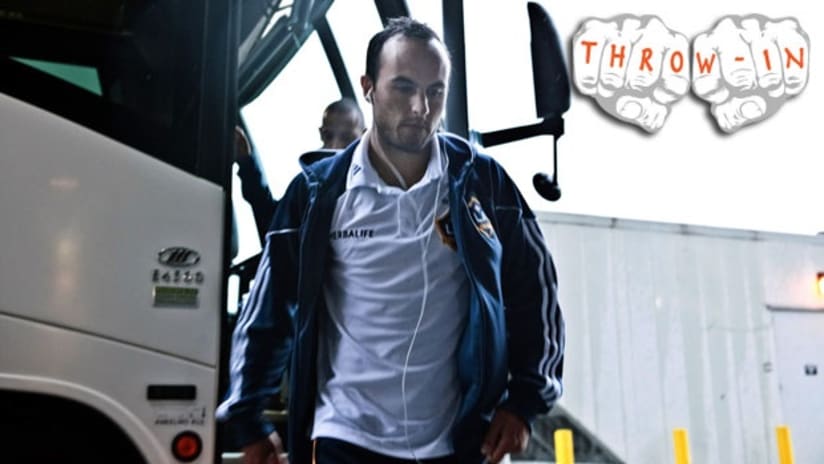Thanks to Sean Franklin, one of the most troubling trends of the 2011 MLS season remains alive and well.
With the LA Galaxy seven minutes from grabbing a win at PPL Park on Wednesday night, the right back made an ill-timed back pass to Donovan Ricketts that Danny Mwanga intercepted. The second-year Union forward promptly accepted Franklin’s gift and buried the equalizer, rescuing a point for Philadelphia.
In the process, the weary Galaxy became the latest team to fall prey to the Jet Lag Effect: In 24 tries so far this season, no road team playing three time zones from their home city has come away with a victory. Over those two dozen games, the away team has an abysmal 0-12-12 record and has been outscored a shocking 34-14, according to the Elias Sports Bureau.
LA nearly snapped that jinx, but couldn’t hang on just four days after expending boatloads of energy in a high-profile 1-1 draw with New York last weekend.
“Playing two games like this is hard,” Landon Donovan told reporters Wednesday night, “and then when you throw in six hours of travel, it makes it very difficult — it’s one aspect that some people don’t really understand.”
Cross-country travel: It’s one of the biggest challenges of playing in MLS, and is almost completely unique to this league. Players may be used to long flights for international games, but spending five hours or more in an airplane on a regular basis for club games — and the subsequent three-hour time shift that comes with it — doesn’t happen anywhere else in the world.
It’s something European and South American players cite as one of the biggest challenges of adjusting to MLS. And as the league keeps expanding — particularly on both coasts — it’s a challenge that will continue to vex MLS squads until they figure out a way to deal with it. The Jet Lag Effect has existed since the league’s founding, but according to Elias’ research, the trend has never been as extreme at any other point in league history.
Continued expansion on the coasts is making sure of that. Two-thirds of MLS’ 18 teams are in Eastern and Pacific Time, and next year’s addition of Montreal will add a 13th. To put it another way: Including the Impact, all seven of MLS’ most recently added teams are based in Pacific or Eastern Time.
“The travel’s not going to get any shorter,” Chivas USA’s Alejandro Moreno told MLSsoccer.com by phone earlier this week as the Goats prepare for a weekend jaunt to Red Bull Arena. “All these games are difficult to prepare for. It’s difficult [for teams] to create a dynamic during the week to account for travel. Once you get that done, it’s up to the players.”
Long story short, the travel conundrum is not going away. How teams deal with it is what matters. Moreno, a 10-year veteran of teams on both coasts and in the middle, has made more cross-country trips than he can keep track of. He understands better than anyone how difficult it is for a team to disrupt its weekly routine and sleep habits and be expected to perform at a high level.
For younger players, it’s a challenge to become disciplined enough to force yourself to go to bed early to adjust to a new time zone, then be prepared to re-adjust. For veterans, multiple days away from loved ones are a psychological toll that can drag on.
But more than anything, Moreno says, MLS’ coastal teams suffer from a mind set where they can’t get past the idea that cross-country travel is an enormous obstacle. That offers up a unique challenge all its own where teams are merely playing not to lose, he says.
“When you stop playing for the win, teams pressure you and you almost fall into a defensive shell,” the Venezuelan international said. “All of a sudden you’re giving up too much space, and often you give up a late goal.”
And that’s exactly what plagued the Galaxy in Philadelphia, and those same Union in Portland last Friday. It may be physical exhaustion, it may be mental exhaustion, it may be a combination of both, but it’s clear that teams have yet to master the challenges of long road trips.
What’s the solution? It may just be players getting their heads screwed on straight, according to many league veterans. The travel itself is something players cannot control. What they can control is their own personal habits. Get to bed at a decent hour and don’t stay up watching TV. Eat wisely. Re-create your normal routine as much as possible.
Julian de Guzman even touched on the travel problem after Toronto FC’s defeat at FC Dallas on Wednesday night. While that’s only a one-timezone shift, and a mere three-and-a-half-hour flight, the midfielder’s comments on his team’s loss of focus spoke volumes.
“It starts on the plane,” he told MLSsoccer.com. “It’s about the rest you get, the food you eat the day before. Our players, especially the younger guys, need to learn how to take care of themselves and deal with the challenges.”
Three more teams will get the chance to break the Jet Lag Effect this weekend. Whoever becomes the first to do so may just have this whole thing figured out.
Jonah Freedman is the managing editor of MLSsoccer.com. “The Throw-In” appears every Thursday.
Related
On the Road: Organizing, Planning and Preparing Key to Road Success
Galaxy All-Access Podcast: Chris Birchall
Galaxy left to lament missed opportunities vs. Union
Match Recap: LA & Philadelphia


